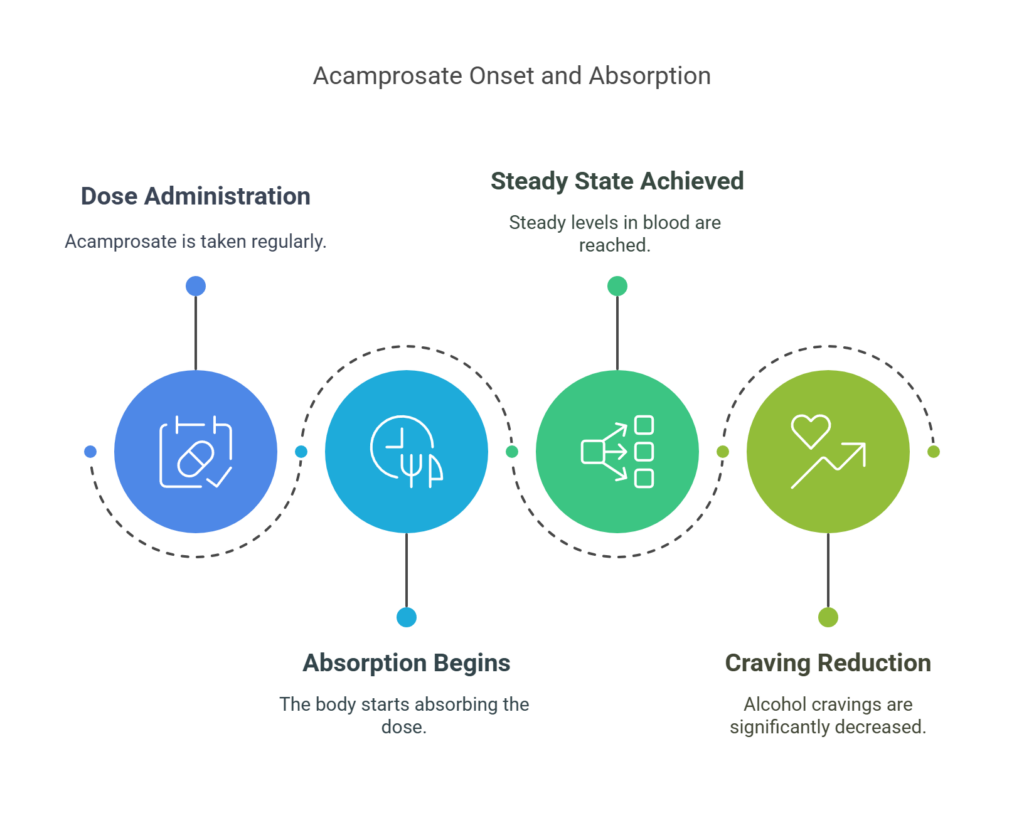One of the most common questions patients or their families may ask their physicians is: How Long Does Acamprosate Take To Work? Acamprosate is a prescription medication used to treat alcohol use disorder (AUD) by reducing alcohol cravings.
In 2016, over 3 million individuals lost their lives due to the detrimental effects of alcohol consumption, as reported by the World Health Organization (WHO). Alcohol addiction has become a lot more common nowadays, and this talk by Dr. Ed Ratush expresses optimism about integrating technology and AI to treat drug addicts in a better and improved manner. This is usually done by offering objective guidance and monitoring patients’ progress, which can enhance personalized care and support recovery efforts more effectively.
Acamprosate is an essential medication for those who are prescribed it. To make the most of acamprosate, it’s necessary to understand how it works and what to expect.
In this guide, we’ll address some common questions about acamprosate, including how long does acamprosate take to work and the potential effects of consuming alcohol while on the medication.
What is Acamprosate?
Acamprosate, also referred to as Campral or acamprosate calcium, is a medication approved by the Food and Drug Administration for the treatment of alcohol dependence. Acamprosate is a pharmaceutical agent utilized to aid individuals in overcoming alcohol dependence by assisting in the mitigation of cravings and the sustenance of abstinence.
It functions by reducing cravings for alcohol in individuals endeavoring to cease drinking, thereby diminishing the likelihood of relapse. Unlike certain other medications, acamprosate does not induce adverse reactions if alcohol is consumed while taking it.
How Does Acamprosate Work?
Acamprosate, also known as Campral, helps reduce the brain’s dependence on alcohol by interacting with neurotransmitter systems like glutamate and gamma-aminobutyric acid (GABA). Unlike other medications for alcohol dependence, acamprosate is broken down in the digestive tract rather than the liver, making it safe for those with alcohol-related liver diseases. It may also be suitable for individuals with Crohn’s disease who struggle with alcohol abuse.
Long-term alcohol abuse changes the brain’s chemistry, leading to tolerance and dependence. When someone with alcohol addiction stops drinking, their brain may struggle to function correctly, which causes cravings and withdrawal symptoms. These symptoms can be uncomfortable, painful, and even life-threatening without medical help.
How Should Acamprosate Should Be Used?
Acamprosate is a delayed-release tablet taken by mouth, usually three times a day with or without food. Try taking it with breakfast, lunch, and dinner to remember your doses.
Follow the exact directions on your prescription label, and ask your doctor or pharmacist if you have any questions. Take only what is prescribed. Swallow the tablets whole without splitting, chewing, or crushing them.
Acamprosate Brand Name
Campral is covered by the government’s Pharmaceutical Benefits Scheme (PBS), making it more affordable. With a health care card, it costs about $6.60 per month, and without a concession, it costs around $41 per month. You can get Campral with a prescription from your doctor. While Campral is a discontinued brand name, various generic versions of acamprosate are available.
How Long Does Acamprosate Take To Work?
When answering how long does acamprosate take to work, count patients’ varying physical and mental aspects. However, Acamprosate takes about 5 days to start working, so you must take it regularly for at least 5 days to experience the full benefits. After this initial period, continue taking acamprosate consistently to maintain its effectiveness.

The tablets are designed for slow, gradual release of the medication, so they should be swallowed whole—never crushed, cut, or chewed. After about five days of consistent use, the medication levels in your system will stabilize.
How long does acamprosate take to work is different from how long it takes acamprosate to be absorbed. Your body absorbs each acamprosate dose in just a few hours. Acamprosate comes in delayed-release tablets; the usual dose is two tablets taken three times a day, with or without food. It’s designed to help prevent cravings and the urge to drink in people with alcohol use disorder. However, it is not intended to treat alcohol withdrawal symptoms. Instead, it is prescribed after detox to help prevent relapse.
Possible Side Effects of Acamprosate
While exploring how long does acamprosate take to work, it is essential to know the possible side effects of acamprosate. Most acamprosate side effects are mild and tend to subside as treatment continues. This makes it a safe and comfortable option for treating alcoholism, especially for individuals with liver problems.
Some familiar to severe side effects are:
- Increased heartbeat
- Changes in hearing
- Dizzy spells and fainting
- Difficulties urinating
- Loss of appetite
- Weakness
- Nausea and vomiting
- Diarrhea
- Difficulties sleeping
- Severe itchiness
- Headaches
- Difficulties concentrating
- Anxiety
- Vision problems
- Depression
- Suicidal thoughts
- Anhedonia (the inability to feel pleasure)
Always connect to a healthcare provider when these side effects persist.
Things to Consider Before Taking Acamprosate
Before taking acamprosate:
- Inform your doctor and pharmacist if you are allergic to acamprosate or other medications, sulfites, or ingredients in acamprosate tablets.
- Share all prescription and nonprescription medications, vitamins, supplements, and herbal products you are taking, including antidepressants.
- Inform your doctor if you have had thoughts of harming yourself, have a history of depression or kidney disease, are pregnant, planning to become pregnant, or are breastfeeding.
- Notify your doctor if you are undergoing surgery, including dental procedures.
- Be aware that acamprosate may affect your thinking, decision-making, and coordination. Avoid driving or operating machinery until you understand how it affects you.
- Understand that acamprosate does not reduce the risk of self-harm associated with excessive alcohol consumption and may even increase it. Seek immediate medical attention if you experience symptoms of depression or suicidal thoughts while taking acamprosate.
FAQs: How Long Does Acamprosate Take To Work
Que: How does acamprosate work in the brain?
Ans: The exact way acamprosate works is still being studied, but it seems to help balance two essential chemicals in the brain: glutamate and gamma-aminobutyric acid (GABA).
Que: How long do the side effects of acamprosate last?
Ans: Acamprosate, like all medications, may cause side effects, although not everyone experiences them. These minor side effects typically resolve within a few days or weeks.
Que: Does acamprosate work for food cravings?
Ans: The balance between GABA and glutamate affects alcohol and food cravings. Acamprosate helps by adjusting this balance, reducing cravings.
Que: Does acamprosate help with sleep?
Ans: Acamprosate reduces the time spent awake after falling asleep and prolongs the time it takes to enter stage 3 and REM sleep.
Que: What is the success rate of acamprosate?
Ans: The rate of individuals who completely abstained from alcohol was assessed by analyzing the time until the first relapse over a 6-month treatment period. It was found to be 35% and 26% for those taking acamprosate.
Conclusion
Overall, answering how long does acamprosate take to work covers various aspects. Acamprosate usually starts working after about 5 days. Experts suggest taking it for at least 6 months. Common side effects include nausea, diarrhea, and gas. Sometimes, it can also cause mood changes like depression and suicidal thoughts.
If you start drinking alcohol again while on acamprosate, keep taking it, but inform your doctor immediately for further guidance in your recovery journey.



















